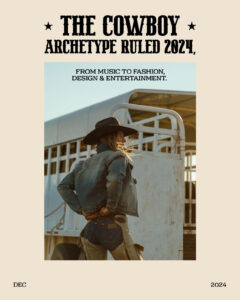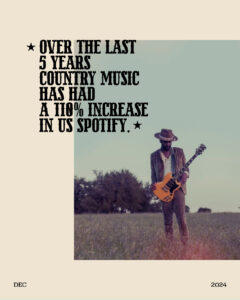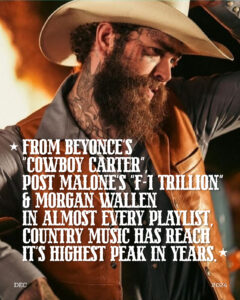Yehaw! How Cowboycore Defined 2024’s Aesthetics
 In 2024, the cowboy archetype emerged as a dominant cultural force, influencing various aspects of society from music and fashion to entertainment and food. The impact of cowboycore became undeniable and we’re exploring its resurgence.
In 2024, the cowboy archetype emerged as a dominant cultural force, influencing various aspects of society from music and fashion to entertainment and food. The impact of cowboycore became undeniable and we’re exploring its resurgence.
The cowboy aesthetic, deeply rooted in American folklore, has experienced a remarkable revival in recent years. With a notable increase in the popularity of country music and a resurgence in fashion that pays homage to Western traditions, cowboycore has become synonymous with a lifestyle that celebrates authenticity, simplicity, and a connection to the past. As we explore this phenomenon, it becomes evident that cowboycore is not merely a fleeting trend but a profound cultural move

ment that resonates with diverse audiences. In an increasingly complex world, the principles of cowboy culture offer timeless guidance for ethical living. Rooted in the legendary “Code of the West,” these unwritten rules emphasize values such as honesty, integrity, and
respect for others. In challenging times, this cultural framework serves as a unifying force, reminding us of our shared humanity.
The past five years have seen an extraordinary transformation in the landscape of country music, with a staggering 110% increase in Spotify streams in the United States. This surge is exemplified by chart-topping hits such as Beyoncé’s “Cowboy Carter,” Post Malone’s “F-1 Trillion,” and Morgan Wallen’s omnipresence on playlists across the nation. These artists have played pivotal roles in elevating country music to unprecedented heights, marking its highest peak in years. Furthermore, the ge
nre’s enduring legends—Dolly Parton, Garth Brooks, and Taylor Swift—continue to captivate audiences, ensuring that the cowboy spirit remains alive and well. And of course, let’s not forget about other icons like Miley Cyrus who have kept the cowboy spirit alive throughout the years.
High fashion and streetstyle have also embraced the cowboy aesthetic with fervor with individuals incorporating

elements such as fringed jackets, wide-brimmed hats, and denim on denim into their daily wardrobes. This fusion of ruggedness and elegance mirrors society’s growing appreciation for this lifestyle. Notably, Louis Vuitton’s autumn/winter ’24/’25 menswear collection showcased Pharrell Williams’ homage to cowboy culture during Paris Fashion Week, where he reimagined Western wear through a modern lens.
Following Beyoncé’s release of “LEVII’S JEANS” from her hit album “Cowboy Carter,” Levi’s partnered with the megastar for a new campaign that celebrates denim as the ultimate symbol of Americana—an emblem of self-expression and empowerment. Gap collaborated with renowned Harlem tailor Dapper Dan to create Western-inspired pieces that blend high fashion with rustic charm. Furthermore, it’s time to think about timeless icons like the Canadian singerOrville Peck who has embraced cowboy aesthetics in his music and style for years. His signature fringed masks and homage to classic country music resonate with a diverse audience, reinforcing the cowboy’s enduring appeal in popular culture.
Cowboycore’s influence extends beyond music and fashion into the realms of film and theater. The acclaimed television series Yellowstone garnered significant recognition at the Golden Globe Awards, with Kevin Costner
 winning Best Performance by an Actor in a Television Series in 2023. Additionally, the 2024 Tony Award-winning musical adaptation of S.E. Hinton’s classic novel The Outsiders demonstrates how cowboy themes continue to captivate audiences on Broadway. These examples illustrate how cowboycore remains relevant in contemporary entertainment narratives.
winning Best Performance by an Actor in a Television Series in 2023. Additionally, the 2024 Tony Award-winning musical adaptation of S.E. Hinton’s classic novel The Outsiders demonstrates how cowboy themes continue to captivate audiences on Broadway. These examples illustrate how cowboycore remains relevant in contemporary entertainment narratives.
Culinary expressions of cowboy culture are equally noteworthy. In New York City, establishments like Pik Nik BBQ in Tarrytown offer quintessential cowboy cuisine characterized by smoked and slow-cooked dishes that embody simplicity and flavor. For those seeking a taste of Southern Cajun style, The Boil at Waverly Place provides an authentic experience that celebrates communal dining and hearty fare. These culinary ventures reflect the broader cultural embrace of cowboycore, inviting patrons to savor flavors that echo the rugged charm of Western traditions.
In conclusion, 2024 has witnessed an extraordinary resurgence of cowboycore across multiple facets of society. From music’s popularity to fashion’s embrace of Western aesthetics and entertainment’s continued fascination with cowboy narratives, this cultural movement encapsulates a longing for authenticity and connection to our roots. As we navigate an increasingly complex world, the timeless principles embodied by cowboy culture serve as a reminder of the values that unite us all—a celebration of freedom, individuality, and community spirit that will undoubtedly continue to resonate for years to come.
The Editors